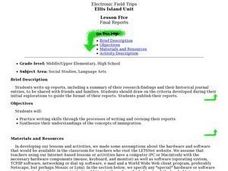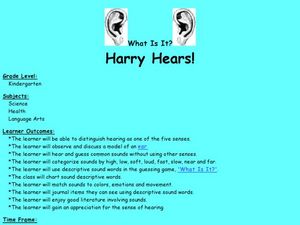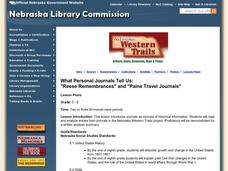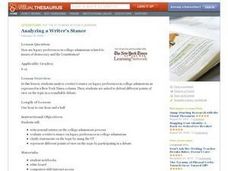Curated OER
Final Reports
Students write reports, including a summary of their research findings and their historical journal entries, to be shared with friends and families, and publish their reports.
Curated OER
Egyptian Diary Project
Seventh graders complete a journal activity in conjunction with a study of ancient Egypt. In this history and writing lesson, 7th graders write a journal entry based on the life of an ancient Egyptian pharoah they create.
Curated OER
Why Plants Are Important to Us
First graders explore plant life. In this plant lesson, 1st graders examine various plant life and categorize them. Students graph their data and make journal entries regarding their work.
Curated OER
Fractions: Mud Pie Math
Second graders identify and name fractional parts through the use of mud pie manipulatives. In this fractional manipulatives lesson, 2nd graders identify and label halves, thirds, fourths, sixths, eighths, and tenths and order them...
Curated OER
Changing Images of Childhood in America: Colonial, Federal and Modern England
Students compare and contrast maps of New Haven, Connecticut from today and the past. After taking a field trip, they draw sketches of the types of architecture and discuss how the buildings have changed over time. They read journal...
Curated OER
Accounting -- Preparing Payroll Records
Students review preparation of payroll records and practice these skills while playing games on the computer. They follow a student outline and complete online activities and quiz.
Curated OER
Who is Rube Goldberg?
Fifth graders practice technology skills while searching online for information about inventor, Rube Goldberg. They discuss Rube Goldberg's use of simple machines, and write journal entries about their findings.
Curated OER
What Is It? Tommy Tastes
Students complete multi-curricular to learn about senses and sensory words. For this sensory words lesson, students discuss the five senses and the anatomy of a tongue. Students complete a food tasting activity and find descriptive words...
Curated OER
Harry Hears!
Students explore ear anatomy and the sense of hearing. In this hearing lesson plan, students discuss the five senses and view a model of an ear. Students place cotton balls in their ears to simulate loss of hearing. Students use...
Curated OER
What You See Isn't Always What You Get!
Students explore AIDS. In this health lesson, students participate in 2 classroom activities that reinforce the concept that HIV infection is not apparent in physical appearance. Students discuss the activities and write about their...
Curated OER
History of Tecumseh and Battle at Tippecanoe
Students research the events surrounding the Battle of Tippecanoe using the computer and a website. Students role play the Battle of Tippecanoe. Students write journal entries from the perspective of each side in the conflict. Students...
Curated OER
Escape to Freedom
Students read 'They Called Her Moses," create a wanted poster for Tub man, compose a journal entry imagining they are William Still, and in groups, create a newspaper depicting the incident of the runaway slaves and events from the time...
Curated OER
Life on the Lewis and Clark Trail
Students examine the lives of Lewis and Clark. Putting themselves in their shoes, they identify the hardships and circumstances faced by them on the trail. Using the internet, they read journal entries from different points of view. ...
Curated OER
The Kidlink Day Project
Students create journal entries on-line as part of a "Kidlink Day" activity. Entries are compared and evaluated by their peers. The writing process is practiced in this lesson.
Curated OER
Using Statistics to Uncover More Evidence
Fifth graders participate in an online Web lesson plan on ways of interpreting data. They conduct a survey and interpret the results in a journal entry.
Curated OER
Let's do dinner
Students observe the benefits of family structured activities. In this social studies lesson plan, students keep a journal of their experience in having dinner with their families every night for a week. Students research the importance...
Curated OER
Hardships of the Maine-land
Fifth graders examine the design of the Maine quarter reverse and identify the objects depicted. They compare the settlement at Popham, Maine with that at Jamestown, Virginia.They write journal entries and draw pictures about the Maine...
Curated OER
Daily Journals
Students develop writing skills by writing in computer-based journals throughout the schools year. This lesson for the upper-elementary classroom uses the Timeliner educational software program and can be adapted for a variety of levels...
Curated OER
What Personal Journals Tell Us
Learners read primary source journals from the Nebraska Western Trails Project. They work in groups to analyze the journal entries and complete a worksheet. Students then write an individual essay on the experience and consider what kind...
Curated OER
Historical Fiction: Persuasive Presentation
Fifth graders read a book addressing a specific historical time period that was chosen by their working group. They complete journal entries as they read the book. They create a group PowerPoint explaining the personal point of view and...
Curated OER
Butterfly Life Cycle
Third graders investigate the life cycle and development of butterflies. They complete an online WebQuest, and write journal entries about their research information. Students create a poster, and observe real Painted Lady larvae...
Curated OER
Protection and Compassion
Students investigate ways to protect themselves against AIDS while learning compassion for the those with the disease. In this HIV/AIDs lesson plan, students discuss ways to protect themselves against contacting the disease. Students...
Curated OER
Analyzing a Writer's Stance
Should college admissions decisions be based on whether whose family members attended? Secondary students read and respond to a New York Times article on the issue of 'legacy preferences' in college admissions. Following class...
Curated OER
WANTS VS. NEEDS
Students gain an appreciation for wants and needs by analyzing poems, researching spending choices on the internet, interviewing family members, and create power point slides.

























